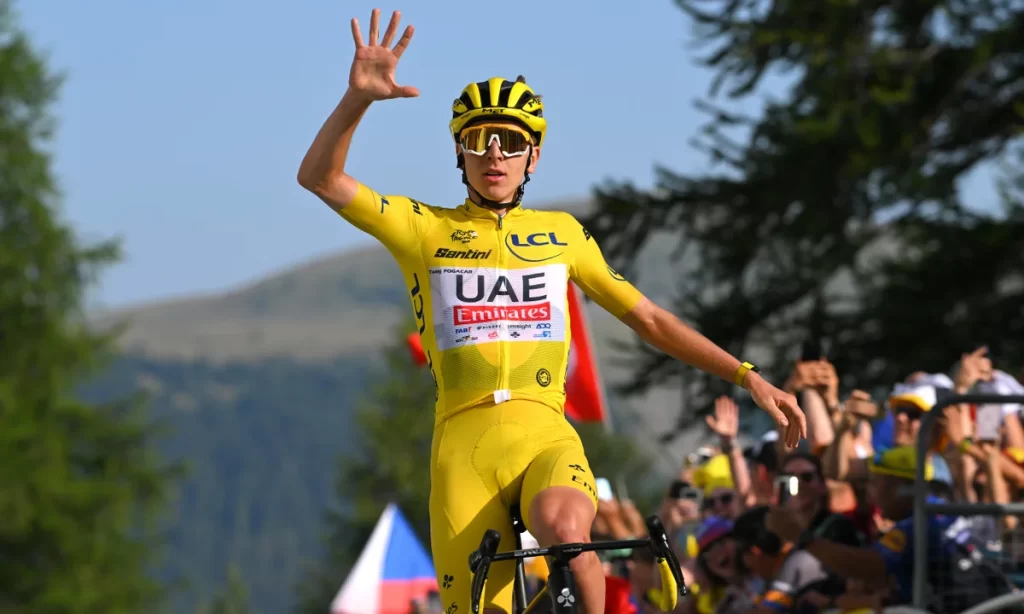Tadej Pogačar: Dominance on Two Wheels and a Future of Uncharted Goals
4 min read
Pogačar celebrates winning stage 20 of this year's Tour de France.

Pogačar celebrates winning stage 20 of this year's Tour de France.
When Tadej Pogačar made his dramatic ascent at the Col de la Couillole, overtaking his formidable rival Jonas Vingegaard and crossing the finish line with a triumphant display, it marked a significant moment in the cycling world. This spectacular performance all but sealed his third Tour de France title, showcasing his dominance over the past three weeks.
Although winning the penultimate stage of the Tour de France was not essential for Pogačar to claim victory, his impressive performance on that stage underscored his exceptional control over the race. His dominance extended beyond this year’s Tour; he had already made history earlier in the season by winning the Giro d’Italia, becoming the first cyclist to achieve this double since Marco Pantani in 1998.
Only eight riders in history have managed to win both the Giro d’Italia and the Tour de France in the same year, and the 25-year-old Slovenian is now part of that exclusive group. Reflecting on his success, Pogačar admits it was beyond his initial expectations. “When I was younger, I never thought I could win a stage in the Tour de France,” Pogačar said. “Winning the first Tour de France was an ultimate goal for me, and after that, everything felt like a bonus.”
Pogačar first made headlines when he won the Tour de France as the youngest cyclist in the post-World War II era, besting his compatriot Primož Roglič. He continued his winning streak with another triumph the following year, before facing tough competition from Denmark’s Jonas Vingegaard, who seemed to be the only rider capable of challenging him over a three-week race.
Their rivalry has been a defining feature of recent Tours, and the 2024 edition provided Pogačar with an opportunity to assert his superiority once more. He excelled, winning six stages, five of which were in the mountains, while Vingegaard, recovering from a serious crash earlier in the season, struggled to keep pace.
As the youngest rider to secure three yellow jerseys, Pogačar is nearing the all-time record of five, a feat shared by Jacques Anquetil, Eddy Merckx, Bernard Hinault, and Miguel Indurain. Although Lance Armstrong’s seven consecutive Tour victories from 1999 to 2005 are tainted by a doping scandal, the challenge of reaching five remains significant.
“I don’t like to focus on future records or what might be,” Pogačar says. “With three Tours de France wins and potentially another decade of racing ahead, the odds are good for five, but that’s not my primary goal.”
Instead, Pogačar is focused on a race-by-race approach, carefully planning each year with his UAE Team Emirates squad. His versatility allows him to compete effectively across various race types and terrains. His ambitions include winning all five of cycling’s monuments and completing the Grand Tours sweep by adding the Vuelta a España to his achievements. Only Eddy Merckx has accomplished this Grand Tour sweep, long before the modern era of cycling.

Pogačar’s goals seem realistic, given his exceptional talent. Winning the Vuelta would place him among the select few to have conquered all three Grand Tours, a rare achievement within his reach.
This year, Pogačar felt everything aligned perfectly. After his Tour de France victory, he opted out of the Olympics due to fatigue, with the Slovenian Olympic Committee’s surprising exclusion of his partner, Urška Žigart, also playing a role in his decision.
He returned to cycling at the Plume Strong Cycling Challenge in Switzerland, a charity event aimed at raising $1.1 million for humanitarian causes, including the development of rural schools in Sierra Leone. Participating in the ride from Zürich to Venice, Pogačar appreciated the opportunity to combine cycling with charitable work.
The event also served as preparation for the upcoming world road race championships in Zürich. With no Slovenian cyclist having ever won this prestigious one-day event, a victory would further highlight Pogačar’s impressive range of skills.
Pogačar’s homecoming was celebrated with overwhelming enthusiasm in Slovenia, where thousands gathered to honor his achievements. “It was incredible to see so many people turn out in my hometown and Ljubljana,” he says. “We have amazing fans in Slovenia, and I’m deeply grateful for their support.”
Pogačar’s ascent to cycling’s summit has not been solely due to his talent. He credits his team for their meticulous planning and acknowledges rivals like Vingegaard for pushing him to continually improve. “Jonas’s victories made me hungrier and more motivated for the Tour,” Pogačar notes. “Top riders drive each other to reach new levels, balancing competition with mutual respect.”
With both Pogačar and Vingegaard still in their primes, their rivalry promises to continue. As Pogačar strives to carve out his own legacy, comparisons to cycling legends like Eddy Merckx are inevitable. “I can’t compare myself to Eddy Merckx,” Pogačar says. “It’s flattering but also a bit annoying; I want to create my own history.”
Merckx has praised Pogačar, calling him a “blessing” for the sport, a sentiment that resonates with many fans given the young Slovenian’s extraordinary talent and accomplishments.